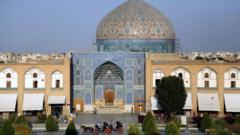1 hour ago
About sharing
Videos sent to BBC Persian by residents from Isfahan show explosions over Isfahan in Iran
Famed for its palaces, tiled mosques and minarets, Isfahan – where blasts were heard overnight – is also a major centre for military industry.
Iran’s third-biggest city, nicknamed “Nesf-e-Jahaan” or half the world, is located in the centre of the country near the Zagros mountains.
The city and its region are home to drone and ballistic missile factories.
Relatively nearby is the Natanz nuclear facility, the most important centre for Iran’s nuclear enrichment programme.
With the name Isfahan tied to Iran’s nuclear facilities, the symbolism of an attack there will not have gone unnoticed.
If this was an Israeli attack it seems that the government of Benjamin Netanyahu was sending a message to Iran that it has the capability to strike those sensitive targets in the province whilst refraining from actually doing so at this stage.
Iranian officials were quick to announce that the nuclear facilities in Isfahan province were “completely secure”. Iran, which does not have nuclear weapons, denies it is attempting to use its civilian nuclear programme to become a nuclear armed state.
However there are conflicting reports of what happened overnight. Iran’s space agency spokesman Hossein Dalirian said “several” drones had been “successfully shot down” and rejected reports that a missile attack had taken place.
Some Iranian media have reported three explosions near Isfahan airport and a military air base. Iran has not confirmed that this was an attack by Israel.
Iran’s army commander-in-chief Abdolrahim Mousavi attributed Friday’s explosions to “the firing of anti-aircraft defence systems on a suspicious object”.
Iranian media and officials said the incident had involved three drones that were launched by “infiltrators”.
The Iranian air force has a base at Isfahan airport, which houses some of its ageing F-14 fighter jets.
Iran first acquired the US-made F-14s in the 1970s under the Shah and has managed to keep them flying since then. It is the only country in the world still flying the fighters of Top Gun fame operationally.
Isfahan has also come under suspected Israeli attack before. In January 2023 Iran blamed Israel for a drone attack on an ammunition factory in a central part of the city. The attack was reported to have been carried out using quadcopters – small drones with four propellers.
Similar drone attacks have been reported in others parts of Iran in recent years. Israel has not confirmed it was behind any of these attacks.
Hamish de Bretton-Gordon, a chemical weapons expert and former head of the UK and Nato nuclear forces, told the BBC that targeting Isfahan was “very significant” because of the number of military bases in and around it.
He said the reported missile strike was also “fairly near to where we believe Iran is trying to develop nuclear weapons so perhaps a nod to that”.
The Israeli strike was “very much a demonstration of capability and perhaps intent”, he said, noting that almost all of the more than 300 drones and missiles Iran fired at Israel last weekend had been intercepted, while Israel had fired “one, perhaps two” missiles at a target and caused “damage”.
Iranian officials were playing the attack down, he said, because they did not want to publicise Israel’s success in getting through Iran’s “antiquated” air defence systems.
“Israel militarily vastly overmatches Iran and this is a demonstration of that,” he said.
“Iran would far more like to fight in the shadows using its terror groups and proxies rather than go toe to toe with Israel conventionally where it knows it would get a real hammering.”
Russia – which has increasingly close military cooperation with Iran – has communicated to Israel that Iran “does not want escalation”, Russian Foreign Minister Sergei Lavrov said on Friday.
“There have been telephone contacts between the leadership of Russia and Iran, our representatives and the Israelis. We made it very clear in these conversations, we told the Israelis that Iran does not want escalation,” Mr Lavrov told Russian radio.
Mr de Bretton-Gordon said Iran had “slightly restored pride” after attacking Israel last weekend, following the suspected Israeli missile strike on its consulate in Syria on 1 April, and did not want to escalate further.
“It knows that Israel is absolutely determined and seems to have the backing of the US and others. Iran can’t really rely on much help, perhaps a little bit from Russia which is very keen to keep the focus on the Middle East and not Ukraine, but apart from that it is a little bit isolated,” he said.
“The last thing they want to do is get some of their key facilities hit.”
2 hours ago
6 hours ago
0:53
4 hours ago
4 hours ago
